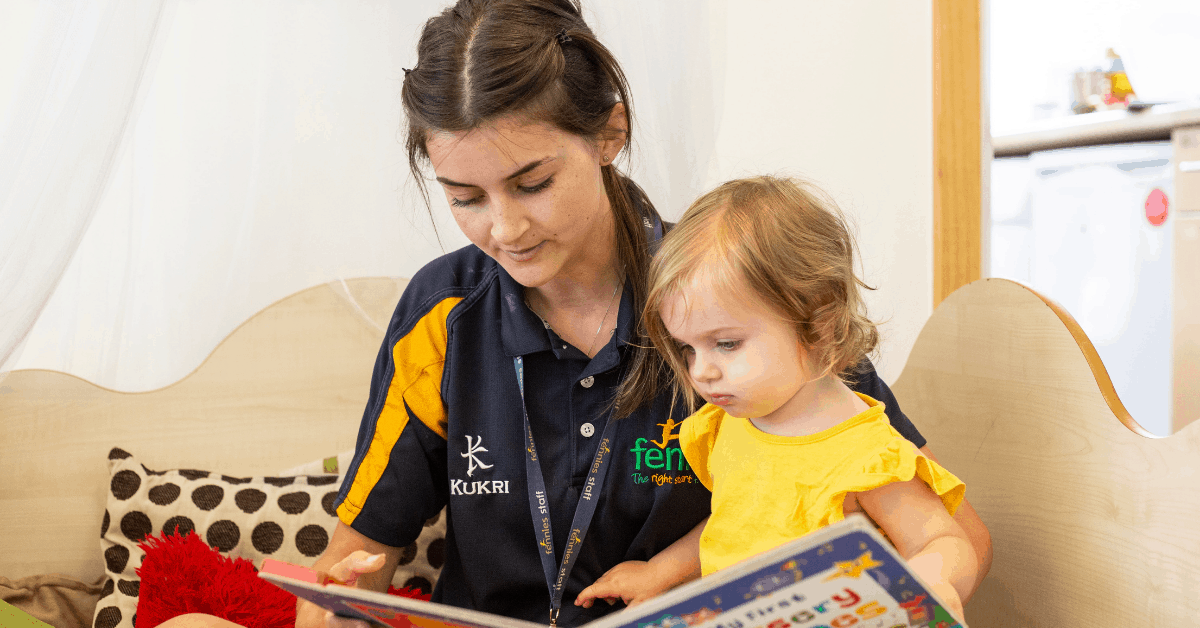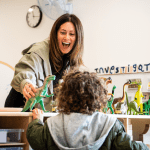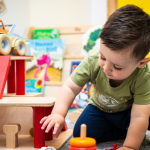



EYFS Operations Manager


Did you know storytelling is a great way to enrich children’s imagination, develop crucial language skills, and introduce an appreciation for different cultures?
We all love stories! Whether they be real-life or completely made up, told to us by friends or family or even total strangers. Stories and tales have formed an integral part of all our lives from a very young age, whether we realise it or not. Fact and fiction books have the power to invoke emotions, transport us to different worlds and teach your child valuable life lessons.
As well as this, regularly reading with your child can help develop a stronger relationship with them by offering feelings of attention, love, and reassurance which is key for nurturing and well-being.
Storytelling provides some excellent language and communication learning opportunities and books are a great way to introduce lots of new vocabulary that your child may not have heard before. At home, we tend to use the same words in our everyday conversation, but stories can enhance children’s language and vocabulary by introducing new words and phrases. It’s also been proven that children are more likely to remember this vocabulary when it’s learned within the context of a story. Reading with young children can help with speech development by stimulating the part of the brain that processes language, even if they can’t fully understand what’s being said, stories can lay the groundwork for when they begin speaking.
Children retain the ability to distinguish sounds whilst their speech is forming up to the age of 5 when 85% of children’s brain development evolves. Phonetics teaches the sounds of the alphabet and every time you read to your child or ask your child to read to you, this reinforces that bond between sounds that form basic language. There has also been a correlation between reading in the early years and higher academic achievement across all subjects in later life.
Regular reading can also help improve children’s concentration skills. Children do seem to have an endless supply of energy, but storytime is a great way for them to settle and focus. Studies have shown that stories can enhance your child’s attention span, improve memory retention, and concentration.


Starting from soft books where babies are drawn in by turning pages themselves and moving on to picture books where they are captivated by exciting, colourful illustrations or photos; the imagination sparked from stories is invaluable.
Stories rely on using imagination for visualising characters, picturing settings, and guessing what’s coming next. Because these elements require the use of imagination, children can then use this background knowledge acquired from stories to make sense of what they see and hear in real life. This not only aids their cognitive development, but it leads to greater creativity which filters into children’s everyday lives.
The introduction of fantastical themes nourishes children’s imagination and provides them with a deep understanding of the world around them.
Stories transport us to far-flung places, offer eye-opening scenarios, and introduce extraordinary people. This gives children an opportunity to learn about and connect with cultures and lifestyles different from their own before they venture out into the world.
Books also show us the inner workings of multiple perspectives and let us know there are different viewpoints. When children under the age of 5 years old regularly read culturally diverse books, they learn that there’s more than one way of viewing the world. This then broadens their capacity for empathy and compassion as they develop more of an ability to understand others.


“Books help children open up and connect with other people. Children use their understanding of empathising with characters they read about in stories and carry this into the real world. This helps children to gain a greater understanding of their own emotions and how others are feelings which can drastically contribute to their social development.”
Danielle Lilley, Fennies Epsom Nursery Manager Tweet
Of course, storytelling doesn’t need a book! This can be quite a daunting thought for many but remember, made up on the spot stories have just as much benefit as reading a book. Also, if you forget a line, you can encourage your child to fill in the blanks as this is a great way for them to develop recall skills and confidence.
Spoken stories give you the opportunity to change outcomes and challenge perceptions, for example, maybe the giant in Jack and the Beanstalk was not scary, maybe he was just clumsy, lonely, and hungry? Posing different scenarios encourages children to think and ask questions, as well as have a giggle!
Don’t forget if you’re telling a story, you can enhance your child’s learning through effective interactions. Children’s books offer fascinating situations for a reason and for them to be the most beneficial, children need to be engaged and interested in what they are hearing. It is clear to see the difference in engagement levels and excitement when reading a book in a monotone ‘newsreader’ manner versus the animated way that children’s entertainers do. Changing the pitch of your voice according to the feelings and emotions in the story as well as using your body language and props to convey the events can really bring your story to life!
This is also a great thing to utilise depending on the time of day your storytime is or what you’re hoping to achieve. We recommend softening your tone of voice before bedtime and incorporating props during bigger productions during the day!


“With babies and younger children, our practitioners make comments rather than ask questions, making sure to pause so that children have time to respond. They will follow the children’s lead, letting them turn pages, taking time to notice children’s interests such as illustrations or rhyme. Our older children are supported in ways such as following their fingers underneath words so that they make the connection between spoken word and print. It can also be useful to introduce questions about cause-and-effect feelings like “how did he feel when that happened?” This can help develop critical thinking and emotional awareness.”
Jamie Atkins, Internal Early Years Trainer Tweet
However, you decide to read a story, remember it should be enjoyable for all involved and create a lovely opportunity for further bonding.
A firm-favourite at Fennies! This lift-the-flap board book allows children to become explorers in search of different zoo animals which are revealed underneath each flap. This tactile interaction is great for engaging young children and getting them involved in the story.
Discover some fun ‘Dear Zoo’ themed activity inspiration.
‘We’re Going on a Bear Hunt’ allows your child to swish-swash and splash-splosh their way around their bear hunt. This book is a timeless classic and a great way to introduce increasingly complex language and sounds.
Watch Michael Rosen’s wonderful performance of the story.
In case you don’t know Elmer, he is a multicolored elephant who lives happily within a grey herd after he tries and fails to hide his true self. Throughout the story, Elmer learns that his friends love him for his uniqueness which is why this book is a great way of teaching children that we’re all wonderfully different!
Find out the valuable life lessons Elmer has to offer!
‘The Tiger Who Came to Tea’ is a staple on all our nurseries bookshelves. The vibrant illustrations make it a true classic which engages children and parents alike. The simple but charming story make it the perfect book to read together!
Download the audiobook for free.












View All
This website uses cookies so that we can provide you with the best user experience possible. Cookie information is stored in your browser and performs functions such as recognising you when you return to our website and helping our team to understand which sections of the website you find most interesting and useful.
You can read out full privacy policy here
Strictly Necessary Cookie should be enabled at all times so that we can save your preferences for cookie settings.
If you disable this cookie, we will not be able to save your preferences. This means that every time you visit this website you will need to enable or disable cookies again.